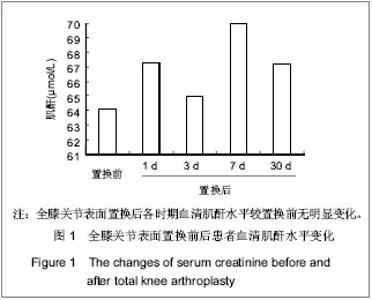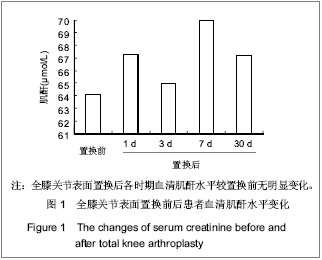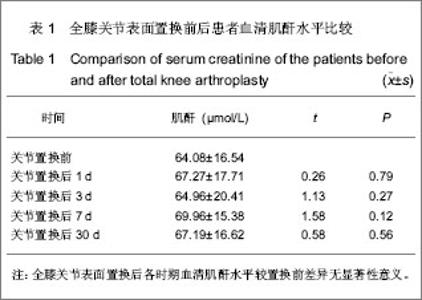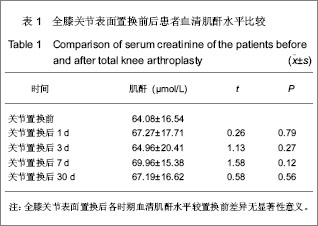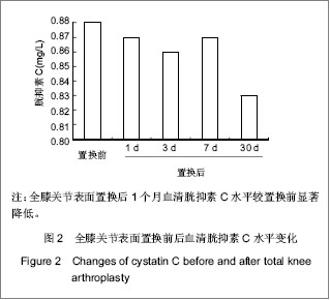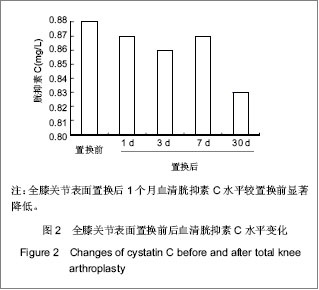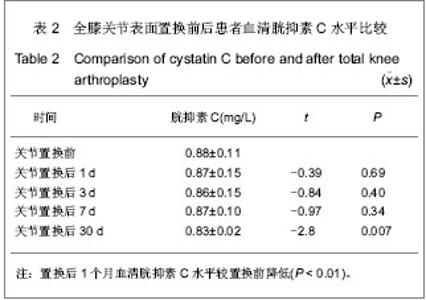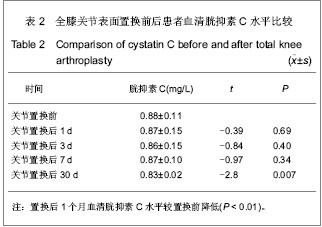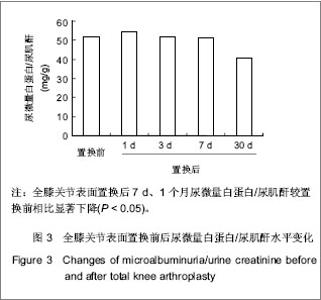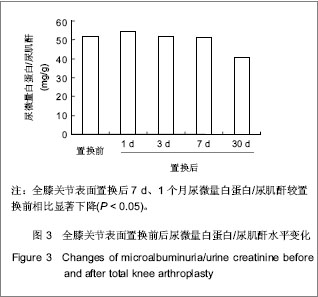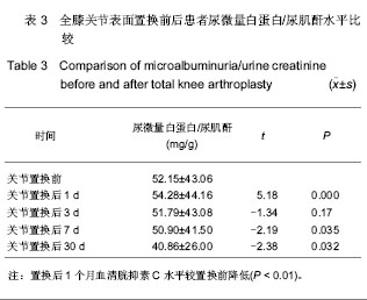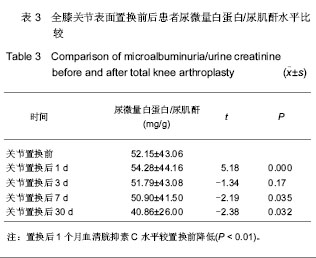Chinese Journal of Tissue Engineering Research ›› 2013, Vol. 17 ›› Issue (17): 3065-3072.doi: 10.3969/j.issn.2095-4344.2013.17.004
Previous Articles Next Articles
Changes of renal function of patients with first unilateral total knee arthroplasty
Zhang Peng1, Liu Jun2, Duan Yuan-hui2, Long Gang3
- 1 Graduate School of Tianjin Medical University, Tianjin 300070, China
2 Department of Joint Surgery, Nankai University Affiliated Hospital, Tianjin 300121, China
3 Department of Nephrology, Nankai University Affiliated Hospital, Tianjin 300121, China
-
Received:2012-09-06Revised:2012-11-01Online:2013-04-23Published:2013-04-23 -
Contact:Long Gang, Chief physician, Professor, Master’s supervisor, Department of Nephrology, Nankai University Affiliated Hospital, Tianjin 300121, China longgang@hotmail.com -
About author:Zhang Peng★, Studying for master’s degree, Graduate School of Tianjin Medical University, Tianjin 300070, China zhangpeng_2000@126.com zhangpeng_2000@yahoo.com
CLC Number:
Cite this article
Zhang Peng, Liu Jun, Duan Yuan-hui, Long Gang. Changes of renal function of patients with first unilateral total knee arthroplasty[J]. Chinese Journal of Tissue Engineering Research, 2013, 17(17): 3065-3072.
share this article
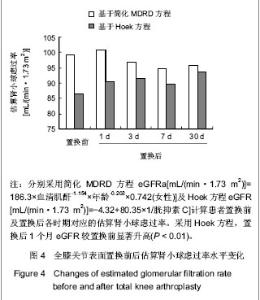
2.5 膝关节表面置换前后患者估算肾小球虑过率的变化 分别采用简化MDRD方程eGFRa[mL/(min·1.73 m2)]= 186.3×血清肌酐-1.154×年龄-0.203×0.742(女性)]及Hoek方程eGFR[mL/(min·1.7 m2)]=-4.32+80.35×1/胱抑素C]计算患者置换前及置换后各时期对应的估算肾小球虑过率,将置换后各时期的估算肾小球虑过率同术前相比,同样采用采用配对资料t 检验作统计学处理。结果显示,采用简化MDRD方程计算出的置换后各时期估算肾小球虑过率较置换前均无明显变化,差异均无显著性意义(P > 0.05);而采用Hoek方程,置换后1周内估算肾小球虑过率较置换前无明显变化,但在置换后1月,估算肾小球虑过率较置换前升高,且差异有显著性意义 (P < 0.01)。采用两种方程计算的估算肾小球虑过率化趋势见图4。"
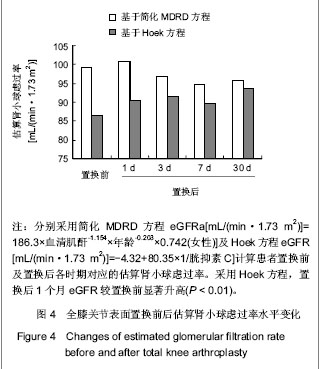
| [1]Lachiewicz PF, Soileua ES. Fifteen-year survival and osteolysis associated with a modular posterior stabilized knee replacement. J Bone Joint Surg Am.2009;91(6):1419-1423.[2]Alan Cheung, Seo Kiat Goh, Andrew Tang, et al. Complications of total knee arthroplasty. Current Orthopaedics. 2008;22:274-283 .[3]Pavone V, Johnson T, Saulog PS, et al. Perioperative Morbidity in Bilateral One-Stage Total Knee Replacements.CLINICAL ORTHOPAEDICS AND RELATED RESEARCH.2004;421: 155-161. [4]Curtis JM, Sternhagen V, Batts D. Acute renal failure after placement of tobramycin-impregnated bone cement in an infected total knee arthroplasty. Pharmacotherapy. 2005; 25(6):876-80.[5]Dovas S, Liakopoulos V, Papatheodorou L, et al. Acute renal failure after antibiotic-impregnated bone cement treatment of an infected total knee arthroplasty. Clinical Nephrology. 2008; 69(3): 207-212.[6]Lapsley M, Sansom PA, Marlow CT, et al. Beta 2-glycoprotein-1 (apolipoprotein H) excretion in chronic renal tubular disorders: Comparison with other protein markers of tubular malfunction. J Clin Pathol.1991;44(10):612-816.[7]Li HX,Zhang CL,Xu GB,et al.Zhonghua Jianyan Yixue Zazhi. 2006;29:970- 974.李海霞,张春丽,徐国宾,等.健康人群血清半胱氨酸蛋白酶抑制剂C与肌酐分布及其评价慢性肾脏病患者肾小球滤过率功能的比较研究[J].中华检验医学杂志, 2006, 29:970- 974. [8]Yang YS,Peng CH,Liu CK, et al.Use of serum CysC to detect early decline of glomerular filtration rate in type 2 diabetes.J Intern Med.2007;46(12):801-806.[9]Summary of Recommendation Statements Kidney International Supplements. KDIGO Clinical Practice Guideline for Acute Kidney Injury .2012; 2:8-12[10]Liu FX,Zhu GY,Su DL.Zhonghua Shiyong Zhenduan yu Zhiliao Zazhi. 2012;26(1):23-24.刘富新,朱国勇,苏大林.血清胱抑素-C水平在骨性关节炎诊断中价值[J].中华实用诊断与治疗杂志,2012,26(1):23-24.[11]Li JC,Chao SB,Chen XW.Shiyong Linchuang Yixue. 2010; 11(7):11-12.李建春,巢时斌,陈小文.胱抑素C联合尿微量白蛋白检测对早期肾功能损害的研究[J].实用临床医学,2010,11(7):11-12.[12]Nergelius G, Lidgren L, Grubb A, et al.Renal dysfunction after total knee replacement is not aggravated by bone cement. Acta Anaesthesiol Scand.1998; 42: 974-981.[13]Fernando José Abelha, Miguela Botelho, Vera Fernandes ,et al. Determinants of postoperative acute kidney injury. Critical Care. 2009;13(3):R79.[14]Tang I, Murray PT. Prevention of perioperative acute renal failure: what works? Best Prac Res Clin Anaesth.2004; 18: 91-111.[15]Mangano CM, Diamondstone LS, Ramsay JG,et al. Renal dysfunction after myocardial revascularization: risk factors, adverse outcomes and hospital resource utilization. The Multicenter Study of Perioperative Ischemia Research Group. Ann Intern Med.1998; 128:194-203.[16]Ma WH,Zhang SD,Wang SJ,et al.Zhonghua Guanjie Waike Zazhi:Dianziban. 2011;5(6):728-732.马卫华,张树栋,王诗军,等.止血带的使用方式对膝关节置换术失血量和手术时间的影响[J/CD].中华关节外科杂志:电子版,2011, 5(6):728-732.[17]Yang TD,Tao J.Zhongqing Yixue. 2006;35(8):673-674.杨天德,陶军,吴悦维,等.术中使用骨水泥引起的严重心血管功能紊乱[J].重庆医学,2006,35(8):673-674.[18]Orsini EC, Byrick RJ, Mullen JBM, et al. Cardiopulmonary function and pulmonary microemboli during arthroplasty using cemented or non-cemented components.Bone Joint Surg (Am). 1987;69-A: 822-832.[19]Nolan JP. Arterial oxygenation and mean arterial blood pressure in patients undergoing total hip replacement: cemented versus uncemented components. Anaesthesia. 1994;49: 293-299.[20]Dai YJ,Wang JR,Ma YL,et al.Hulixue Zazhi. 2010,25(2):49-51.代永静,王建荣,马燕兰,等.液体温度对双侧人工关节置换患者术中肾功能的影响[J].护理学杂志,2010,25(2):49-51.[21]Gee R, Munk P, Keogh C, et al. Radiography of the PROSTALAC (Prosthesis with Antibiotic-Loaded Acrylic Cement) orthopedic implant. Am J Roentgenol. 2003; 180:1701-1706.[22]Belt H, Neut D, Schenk W, et al. Infection of orthopedic implants and the use of antibiotic-loaded bone cement. Acta Orthop Scand .2001;72:557-571.[23]Bertazzoni Minelli E, Benini A, Magnan B, et al. Release of gentamicin and vancomycin from temporary human hip spacers in two stage revision of infected arthroplasty.J Antimicrob Chemother.2004;53:329-334.[24]Sterling GJ, Crawford S, Potter JH, et al. The pharmacokinetics of Simplex-tobramycin bone cement. J Bone Joint Surg Br. 2003;85B:646-649.[25]Goetz MB, Sayers J. Nephrotoxicity of vancomycin and aminoglycoside therapy separately and in combination. J Antimicrob Chemother .1993;32:325-334.[26]Namba RS, Chen Y, Paxton EW, et al.Outcomes of Routine Use of Antibiotic-Loaded Cement in Primary Total Knee Arthroplasty. J The Journal of Arthroplasty. 2009 ;24(6):44-47.[27]Hermann M, Shaw S, Kiss E ,et al. Selective COX-2 inhibitors and renal injury in salt-sensitive hypertension. 2005; 45(2): 193-197.[28]Fu ZQ,Lv GY,Deng NF.Zhongri Youhao Yiyuan Xuebao. 2007; 21(3):178-180.付志强,吕国义,邓廼封.氟比洛芬酯的药理及临床应用[J].中日友好医院学报,2007,21(3):178-180. [29]Nishikawa T, Edelstein D, Du XL, et al. Normalizing mitochondrial superoxide production blocks three pathway of hyperglycaemic damage. J Nature,2002;404: 787-790.[30]van den Berghe G, Wouters P, Weekers F, et al. Intensive insulin therapy in the critically ill patients. N Engl J Med 2001; 345:1359-1367.[31]Huang SJ.Guowai Yixue:Yaoxue Fence. 2000,27(1):21-24.黄世杰.肾保护作用和抗高血压药物的现况[J].国外医学:药学分册.2000,27(1):21-24. |
| [1] | Wang Jinjun, Deng Zengfa, Liu Kang, He Zhiyong, Yu Xinping, Liang Jianji, Li Chen, Guo Zhouyang. Hemostatic effect and safety of intravenous drip of tranexamic acid combined with topical application of cocktail containing tranexamic acid in total knee arthroplasty [J]. Chinese Journal of Tissue Engineering Research, 2021, 25(9): 1356-1361. |
| [2] | Xiao Guoqing, Liu Xuanze, Yan Yuhao, Zhong Xihong. Influencing factors of knee flexion limitation after total knee arthroplasty with posterior stabilized prostheses [J]. Chinese Journal of Tissue Engineering Research, 2021, 25(9): 1362-1367. |
| [3] | Zhang Chong, Liu Zhiang, Yao Shuaihui, Gao Junsheng, Jiang Yan, Zhang Lu. Safety and effectiveness of topical application of tranexamic acid to reduce drainage of elderly femoral neck fractures after total hip arthroplasty [J]. Chinese Journal of Tissue Engineering Research, 2021, 25(9): 1381-1386. |
| [4] | Yuan Jiawei, Zhang Haitao, Jie Ke, Cao Houran, Zeng Yirong. Underlying targets and mechanism of Taohong Siwu Decoction in prosthetic joint infection on network pharmacology [J]. Chinese Journal of Tissue Engineering Research, 2021, 25(9): 1428-1433. |
| [5] | Chen Junming, Yue Chen, He Peilin, Zhang Juntao, Sun Moyuan, Liu Youwen. Hip arthroplasty versus proximal femoral nail antirotation for intertrochanteric fractures in older adults: a meta-analysis [J]. Chinese Journal of Tissue Engineering Research, 2021, 25(9): 1452-1457. |
| [6] | Zeng Zhen, Hu Jingwei, Li Xuan, Tang Linmei, Huang Zhiqiang, Li Mingxing. Quantitative analysis of renal blood flow perfusion using contrast-enhanced ultrasound in rats with hemorrhagic shock during resuscitation [J]. Chinese Journal of Tissue Engineering Research, 2021, 25(8): 1201-1206. |
| [7] | Zhao Zhongyi, Li Yongzhen, Chen Feng, Ji Aiyu. Comparison of total knee arthroplasty and unicompartmental knee arthroplasty in treatment of traumatic osteoarthritis [J]. Chinese Journal of Tissue Engineering Research, 2021, 25(6): 854-859. |
| [8] | Yuan Jun, Yang Jiafu. Hemostatic effect of topical tranexamic acid infiltration in cementless total knee arthroplasty [J]. Chinese Journal of Tissue Engineering Research, 2021, 25(6): 873-877. |
| [9] | Jiang Xin, Qiao Liangwei, Sun Dong, Li Ming, Fang Jun, Qu Qingshan. Expression of long chain non-coding RNA PGM5-AS1 in serum of renal transplant patients and its regulation of human glomerular endothelial cells [J]. Chinese Journal of Tissue Engineering Research, 2021, 25(5): 741-745. |
| [10] | Li Chenjie, Lü Linwei, Song Yang, Liu Jingna, Zhang Chunqiu. Measurement and statistical analysis of trabecular morphological parameters of titanium alloy peri-prosthesis under preload [J]. Chinese Journal of Tissue Engineering Research, 2021, 25(4): 516-520. |
| [11] | Zhang Yu, Feng Shuo, Yang Zhi, Zhang Ye, Sun Jianning, An Lun, Chen Xiangyang. Three-dimensional gait of patients with developmental dysplasia of hip undergoing total hip arthroplasty with high hip center [J]. Chinese Journal of Tissue Engineering Research, 2021, 25(3): 350-355. |
| [12] | Cheng Shigao, , Wang Wanchun, Jiang Dong, Li Tengfei, Li Xun, Ren Lian. Comparison of the standard and long-stem bone cement prosthesis replacement in the treatment of intertrochanteric fractures in elderly patients [J]. Chinese Journal of Tissue Engineering Research, 2021, 25(3): 362-367. |
| [13] | Ma Rui, Wang Jialin, Wu Mengjun, Ge Ying, Wang Wei, Wang Kunzheng. Relationship of pathogenic bacteria distribution with drug resistance and treatment cycle for periprosthetic joint infection after total joint arthroplasty [J]. Chinese Journal of Tissue Engineering Research, 2021, 25(3): 380-385. |
| [14] | Lü Zexiang, Wu Jutai, Jiang Jian, Feng Xiao, Li Tengfei, Wang Yehua. Effect of tranexamic acid combined with carbazochrome sodium sulfonate on blood loss and safety after total knee arthroplasty [J]. Chinese Journal of Tissue Engineering Research, 2021, 25(3): 386-390. |
| [15] | Zhang Liang, Ma Xiaoyan, Wang Jiahong. Regulatory mechanism of Shenshuai Yin on cell apoptosis in the kidney of chronic renal failure rats [J]. Chinese Journal of Tissue Engineering Research, 2021, 25(23): 3672-3677. |
| Viewed | ||||||
|
Full text |
|
|||||
|
Abstract |
|
|||||
